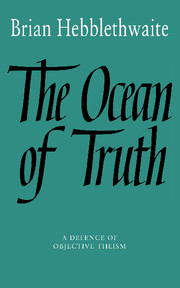Book contents
- Frontmatter
- Contents
- Preface
- 1 Christian belief in God
- 2 The ebbing of theistic faith
- 3 The interiorisation of faith
- 4 Theism in the modern world
- 5 The significance of Kant
- 6 The grounds of theistic belief
- 7 The question of truth
- 8 Religions – theistic and non-theistic
- 9 Life after death
- 10 The Christian Church and objective theism
- Appendix: The Church's ministry
- Notes
- Select bibliography
- Index
Appendix: The Church's ministry
Published online by Cambridge University Press: 06 July 2010
- Frontmatter
- Contents
- Preface
- 1 Christian belief in God
- 2 The ebbing of theistic faith
- 3 The interiorisation of faith
- 4 Theism in the modern world
- 5 The significance of Kant
- 6 The grounds of theistic belief
- 7 The question of truth
- 8 Religions – theistic and non-theistic
- 9 Life after death
- 10 The Christian Church and objective theism
- Appendix: The Church's ministry
- Notes
- Select bibliography
- Index
Summary
Have ordained ministers of the Church a responsibility to teach the objective reality of God? No doubt the primary loyalty of every man and woman is to the truth, as he or she perceives it. But it is not unreasonable to hold that Christian ministers are people who have, among other things, perceived the truth of Christian doctrine and, from a sense of vocation, offered themselves as stewards of the mysteries of God. It is as such that the Church commissions them and invests them with authority to teach the faith, not on their own behalf, but on the Church's behalf, as its spokesmen and spokeswomen.
It is undeniable that there exist among theologians, among ministers, and even among bishops, strong disagreements over doctrine. This has always been the case, and is doubtless inevitable. The prevalence of such internal conflict, since New Testament times, over what makes Christianity the thing it is, has recently been drawn to our attention in a book by Stephen Sykes. Its inevitability is partly due to the transcendence of the object of Christian belief, namely the reality, nature and will of God, over any finite, limited, human representation of them, and partly to the necessary interactions and developments of Christian doctrine in relation to new knowledge in other spheres, such as science and philosophy. Christianity is bound, therefore, to be preached and taught in many different ways and in many disputed ways.
- Type
- Chapter
- Information
- The Ocean of TruthA Defence of Objective Theism, pp. 150 - 153Publisher: Cambridge University PressPrint publication year: 1988



